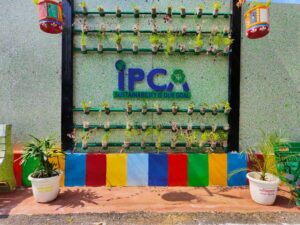Team L&M
Ghaziabad Nagar Nigam (GNN) has done a seemingly impossible task. It has converted an abandoned and filthy area adjacent to Radisson Blu Kaushambi in Kaushambi into a colourful Gazab Street which is not only spic and span but also sports several plants. The renovation of the area was done under GNN’s flagship programme Plastic Tourism, undertaken in collaboration with Delhi-based NGO Indian Pollution Control Association (IPCA), to promote recycling of plastic waste in the city.
This unique street, one of its kind the country, has been developed using recycled plastic waste. Others who partnered in the project include Bisleri, Parle Agro, Radisson Blu Hotel, Haldiram’s and SBI Cards and Payment Services Limited.

The street was inaugurated early today by Ghaziabad Mayor Asha Sharma in the presence of Amrit Abhijat, Principal Secretary, Urban Development Department, Uttar Pradesh, GNN Commissioner Mahender Singh Tawar, and IPCA Founder-Director Ashish Jain.
The idea of Plastic Tourism was conceived in 2020 in order to project and identify Ghaziabad as a city that is an avid promoter of recycling.
“Such projects are the need of the hour and more such streets should be developed to promote recycling of plastic waste. This will motivate people to adopt waste recycling and reusing,” said Tawar.
The GNN renovated the Gazab Street by installing panels made from recycled plastic waste and equipping those panels with vertical garden designed by reusing plastic bottles. Each vertical garden is allocated to a supporting brand partner. The road in conjunction with the panel’s wall has also been repaired to fill the holes in it. The other wall alongside the road has murals. Some of the slabs to cover the drain passing through the street are also made from recycled plastic waste.
What’s more: The Gazab Street is equipped with sitting benches made from recycled plastic waste. The panels, benches and slabs used in the development of the street were fabricated in the Plastic Recycling Facility instituted under the CSR initiative of SBI Cards and Payment Services Limited and is operated and maintained by IPCA.
The Gazab Street, which promotes the recycling of plastic waste by demonstrating the usability of recycled products in an aesthetically appealing manner, is unique in itself and is one of its kind street in India and hence given the name Gazab which literally means amazing.
“The Gazab Street is an appropriate example of circular economy wherein the plastic waste collected from consumers is presented in its recycled form in front of the consumers again which can potentially motivate them to recycle their plastic waste,” said Jain.